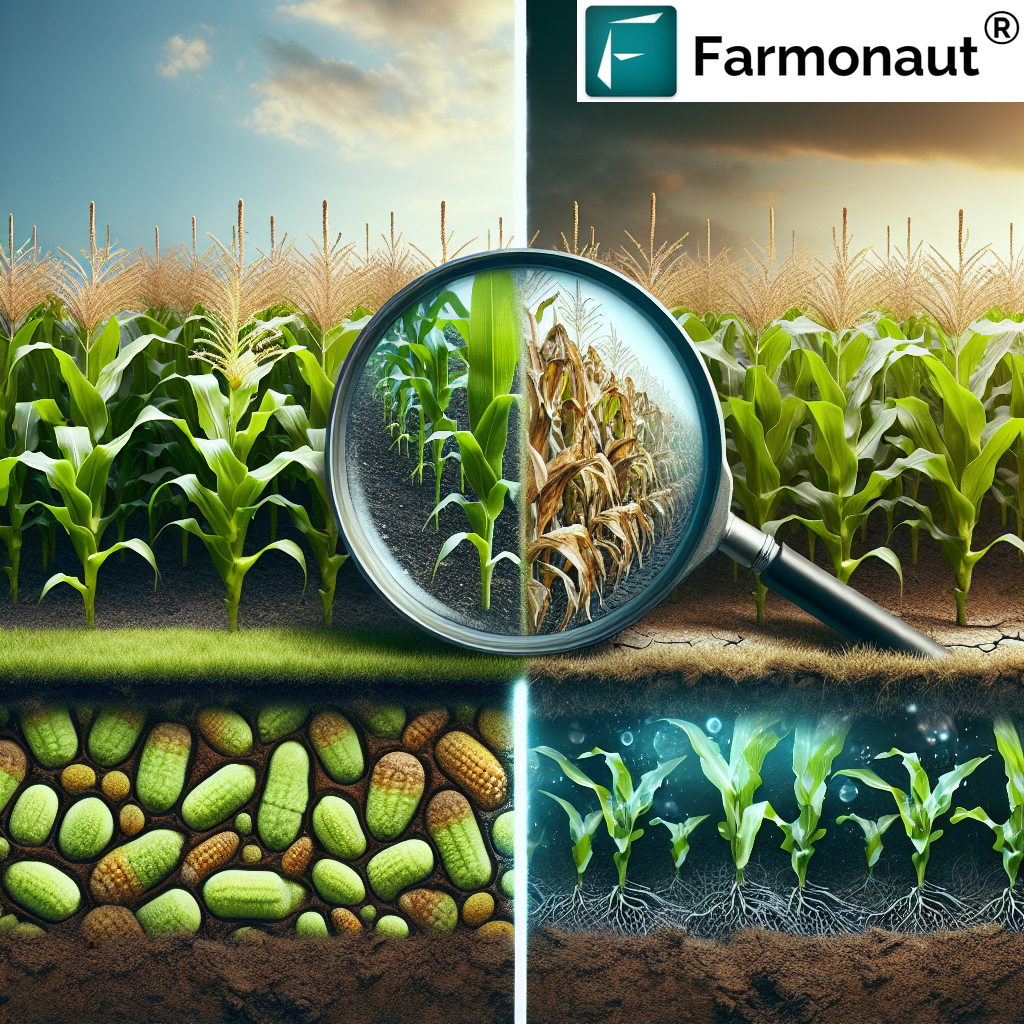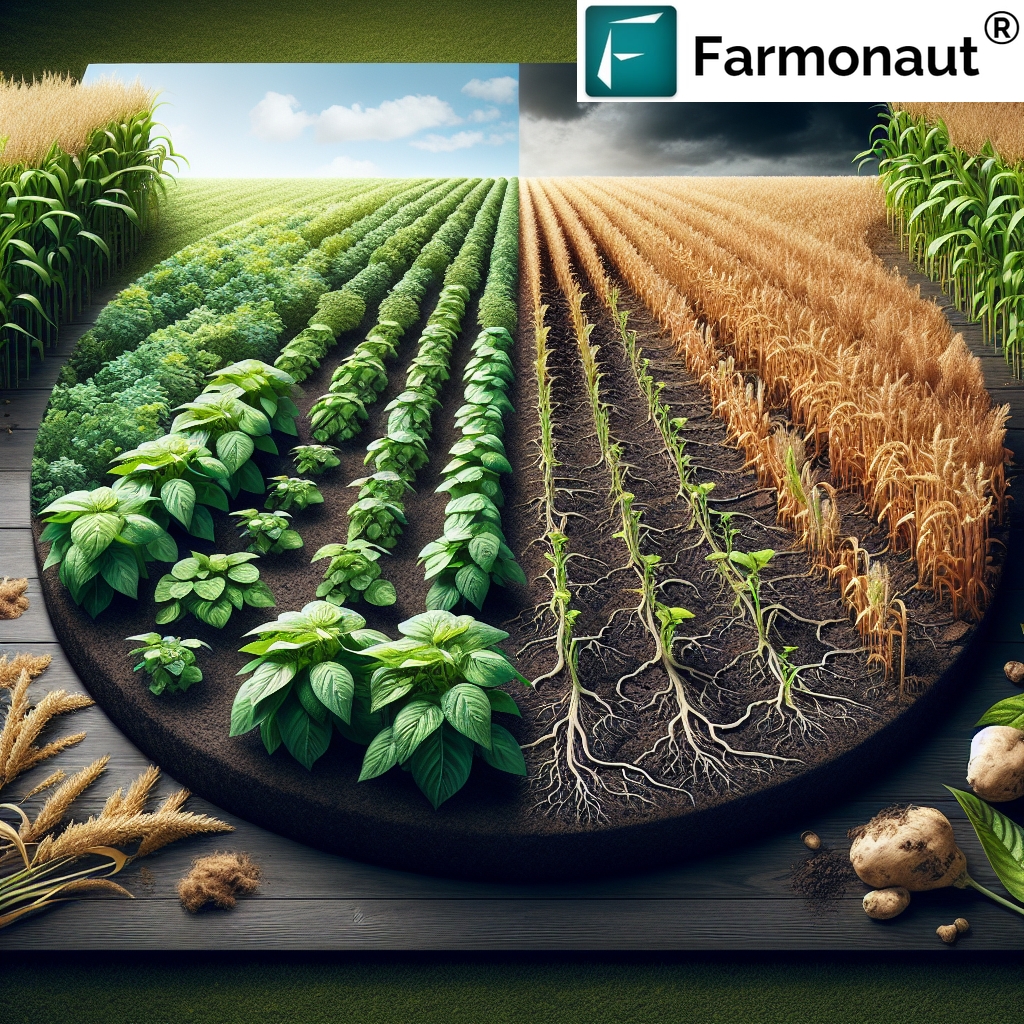Carbon Fertilizer: Unlocking Plant Growth Potential and Its Essential Uses in Modern Agriculture

In the ever-evolving world of agriculture, we are constantly seeking innovative ways to enhance crop productivity, improve soil health, and promote sustainable farming practices. One such groundbreaking solution that has gained significant attention in recent years is carbon fertilizer. As pioneers in agricultural technology at Farmonaut, we are excited to explore the potential of carbon fertilizer and its various applications in modern agriculture.
Understanding Carbon Fertilizer
Carbon fertilizer, also known as biochar or agricultural carbon, is a soil amendment derived from the pyrolysis of organic materials. This process involves heating biomass in the absence of oxygen, resulting in a carbon-rich substance that can significantly improve soil quality and plant growth. The concept of using carbon for plants is not entirely new, but recent advancements in production techniques and a better understanding of its benefits have propelled carbon fertilizer to the forefront of sustainable agriculture practices.
The Science Behind Carbon Fertilizer
To fully appreciate the potential of carbon fertilizer, it’s essential to understand the science behind its effectiveness. Carbon fertilizer works on multiple levels to enhance soil fertility and promote plant growth:
- Soil Structure Improvement: Carbon fertilizer helps improve soil structure by increasing porosity and water retention capacity. This leads to better root development and nutrient uptake by plants.
- Microbial Activity Enhancement: The porous nature of carbon fertilizer provides an ideal habitat for beneficial soil microorganisms, promoting a healthy soil ecosystem.
- Nutrient Retention: Carbon fertilizer has a high cation exchange capacity, which means it can effectively hold and release essential plant nutrients, reducing leaching and improving nutrient use efficiency.
- pH Regulation: Carbon fertilizer can help regulate soil pH, creating a more balanced environment for plant growth.
- Carbon Sequestration: By adding stable carbon to the soil, carbon fertilizer contributes to long-term carbon sequestration, helping mitigate climate change.
Carbon Fertilizer Uses in Agriculture
The versatility of carbon fertilizer makes it applicable across various agricultural sectors. Let’s explore some of the primary carbon fertilizer uses in modern farming:
1. Crop Production Enhancement
One of the most significant carbon fertilizer uses is in enhancing crop production. By improving soil structure and nutrient availability, carbon fertilizer can lead to:
- Increased crop yields
- Better quality produce
- Enhanced plant resistance to pests and diseases
- Improved drought tolerance
At Farmonaut, we’ve observed remarkable improvements in crop health and yield when farmers incorporate carbon fertilizer into their soil management practices. Our satellite-based crop health monitoring system allows us to track these improvements in real-time, providing valuable insights to farmers.
2. Soil Remediation
Carbon fertilizer has shown tremendous potential in rehabilitating degraded soils. Its uses in soil remediation include:
- Reducing soil acidity
- Improving soil structure in compacted areas
- Enhancing water retention in sandy soils
- Mitigating soil pollution by adsorbing contaminants
Our Jeevn AI Advisory System at Farmonaut can provide personalized recommendations on how to use carbon fertilizer for soil remediation based on specific soil conditions and crop requirements.
3. Sustainable Waste Management
Carbon fertilizer production offers an eco-friendly solution for managing agricultural and forestry waste. By converting these waste materials into valuable soil amendments, we can:
- Reduce landfill waste
- Lower greenhouse gas emissions from decomposing organic matter
- Create a circular economy in agriculture
This aligns perfectly with our commitment to sustainable agriculture at Farmonaut, where we strive to help farmers reduce their environmental impact through innovative solutions.
4. Carbon Sequestration
One of the most promising carbon fertilizer uses is its potential for long-term carbon sequestration. By adding stable carbon to the soil, we can:
- Mitigate climate change by removing CO2 from the atmosphere
- Improve soil organic matter content
- Enhance overall soil health and fertility
Our carbon footprinting feature at Farmonaut can help farmers track the impact of carbon fertilizer use on their overall carbon emissions, supporting their sustainability efforts.
5. Water Conservation
In regions facing water scarcity, carbon fertilizer can play a crucial role in water conservation. Its uses in this area include:
- Improving soil water retention capacity
- Reducing irrigation frequency
- Minimizing water runoff and soil erosion
At Farmonaut, our satellite-based soil moisture monitoring can help farmers optimize their irrigation practices when using carbon fertilizer, ensuring efficient water use.

The Role of Carbon for Plants
Understanding the importance of carbon for plants is crucial to appreciating the value of carbon fertilizer. Carbon is a fundamental element in plant biology, playing several vital roles:
- Photosynthesis: Carbon dioxide is the primary raw material for photosynthesis, the process by which plants produce their food and energy.
- Plant Structure: Carbon forms the backbone of all organic compounds in plants, including cellulose and lignin, which provide structural support.
- Energy Storage: Plants store energy in carbon-based compounds like starch and sugars.
- Root Exudates: Carbon-rich root exudates help plants interact with soil microorganisms and enhance nutrient uptake.
Carbon fertilizer enhances the availability and utilization of carbon in the soil, supporting these essential plant functions. At Farmonaut, our advanced satellite imagery and AI-driven analytics help farmers monitor the impact of carbon fertilizer on plant health and growth, ensuring optimal utilization of this valuable resource.
Integrating Carbon Fertilizer with Precision Agriculture
To maximize the benefits of carbon fertilizer, it’s crucial to integrate its use with precision agriculture techniques. At Farmonaut, we specialize in providing cutting-edge solutions that complement the use of carbon fertilizer:
- Satellite-Based Crop Health Monitoring: Our advanced satellite imagery allows farmers to track the impact of carbon fertilizer on crop health in real-time. By analyzing vegetation indices like NDVI, we can provide insights into how carbon fertilizer is affecting plant growth and vigor. Learn more about our crop monitoring solutions.
- AI-Driven Recommendations: Our Jeevn AI Advisory System analyzes data from multiple sources, including satellite imagery and soil tests, to provide personalized recommendations on carbon fertilizer application rates and timing.
- Weather Forecasting: Accurate weather predictions help farmers plan their carbon fertilizer applications for maximum effectiveness. Our weather API provides hyperlocal forecasts to support decision-making. Explore our weather API.
- Resource Management Tools: Our platform offers tools to track and optimize the use of carbon fertilizer along with other inputs, ensuring efficient resource allocation.
By combining these precision agriculture techniques with carbon fertilizer use, farmers can achieve optimal results while minimizing waste and environmental impact.
Farmonaut’s Satellite System vs. Drone and IoT-Based Farm Monitoring
While discussing advanced agricultural technologies, it’s worth comparing different farm monitoring approaches. Here’s how Farmonaut’s satellite-based system stands out:
| Feature | Farmonaut Satellite System | Drone-Based Monitoring | IoT-Based Monitoring |
|---|---|---|---|
| Coverage Area | Large scale (thousands of hectares) | Limited (requires multiple flights) | Limited (depends on sensor placement) |
| Frequency of Data Updates | Regular (every few days) | On-demand (requires manual flights) | Continuous (but localized) |
| Initial Investment | Low (subscription-based) | High (equipment cost) | Moderate to High (sensor network setup) |
| Operational Complexity | Low (user-friendly interface) | High (requires trained operators) | Moderate (maintenance of sensor network) |
| Weather Independence | High (can penetrate clouds) | Low (affected by wind, rain) | Moderate (some sensors weather-sensitive) |
| Data Processing | Automated (AI-driven insights) | Often requires manual interpretation | Automated but may require calibration |
| Scalability | Highly scalable | Limited by equipment and personnel | Scalable but requires infrastructure |
As evident from the comparison, Farmonaut’s satellite-based system offers unparalleled coverage, scalability, and ease of use, making it an ideal choice for monitoring the effects of carbon fertilizer across large agricultural areas.
Case Studies: Success Stories with Carbon Fertilizer
While we don’t have specific case studies to share, we’ve observed numerous success stories among our users who have incorporated carbon fertilizer into their farming practices. These farmers have reported:
- Increased crop yields by up to 20-30% in some cases
- Improved soil water retention, leading to reduced irrigation needs
- Enhanced crop resilience to drought and other stress factors
- Long-term improvements in soil health and fertility
These positive outcomes underscore the potential of carbon fertilizer when used in conjunction with precision agriculture tools like those offered by Farmonaut.
The Future of Carbon Fertilizer in Agriculture
As we look to the future, we at Farmonaut are excited about the growing potential of carbon fertilizer in sustainable agriculture. Some trends and developments we’re watching include:
- Customized Carbon Fertilizers: Research is ongoing to develop carbon fertilizers tailored to specific crops and soil types, maximizing their effectiveness.
- Integration with Precision Agriculture: As precision farming technologies advance, we expect to see more sophisticated methods of applying and monitoring the effects of carbon fertilizer.
- Policy Support: Governments worldwide are beginning to recognize the potential of carbon fertilizer for climate change mitigation, potentially leading to supportive policies and incentives.
- Scalable Production: Innovations in production techniques are making it possible to produce carbon fertilizer at larger scales, potentially reducing costs and increasing availability.
At Farmonaut, we’re committed to staying at the forefront of these developments, continually enhancing our platform to support farmers in their use of innovative solutions like carbon fertilizer.
How Farmonaut Supports Carbon Fertilizer Implementation
Our suite of tools and services at Farmonaut is designed to support farmers in implementing and optimizing their use of carbon fertilizer:
- Soil Health Monitoring: Our satellite-based monitoring helps track changes in soil health over time, allowing farmers to assess the long-term impact of carbon fertilizer use.
- Precision Application: By providing detailed field maps and zone management tools, we help farmers apply carbon fertilizer precisely where it’s needed most.
- Yield Impact Analysis: Our crop yield estimation tools allow farmers to quantify the impact of carbon fertilizer on their productivity.
- Sustainability Tracking: With our carbon footprinting feature, farmers can monitor how carbon fertilizer use contributes to their overall sustainability goals.
To explore how Farmonaut can support your carbon fertilizer implementation, visit our website or download our mobile app:
Frequently Asked Questions (FAQ)
To address some common queries about carbon fertilizer and its uses, we’ve compiled this FAQ section:
- Q: What is carbon fertilizer?
A: Carbon fertilizer, also known as biochar, is a soil amendment made by heating organic matter in the absence of oxygen. It’s rich in carbon and can significantly improve soil health and plant growth. - Q: How does carbon fertilizer benefit plants?
A: Carbon fertilizer improves soil structure, enhances water retention, promotes microbial activity, and increases nutrient availability, all of which contribute to better plant growth and yield. - Q: Is carbon fertilizer suitable for all types of crops?
A: While carbon fertilizer can benefit a wide range of crops, its effectiveness may vary depending on the crop type, soil conditions, and application method. It’s best to consult with agricultural experts or use precision farming tools like Farmonaut for optimal results. - Q: How long does carbon fertilizer last in the soil?
A: Carbon fertilizer can persist in the soil for hundreds to thousands of years, providing long-term benefits to soil health and contributing to carbon sequestration. - Q: Can carbon fertilizer replace traditional fertilizers?
A: While carbon fertilizer can enhance nutrient availability and retention, it’s typically used in combination with traditional fertilizers rather than as a complete replacement. It can help reduce the amount of traditional fertilizers needed over time. - Q: How can I monitor the effects of carbon fertilizer on my crops?
A: Precision agriculture tools like Farmonaut’s satellite-based crop monitoring can help you track the impact of carbon fertilizer on crop health, soil moisture, and overall farm productivity. - Q: Is carbon fertilizer environmentally friendly?
A: Yes, carbon fertilizer is considered environmentally friendly. It helps sequester carbon in the soil, reduces the need for chemical fertilizers, and can be produced from waste biomass, contributing to sustainable agriculture practices. - Q: How often should I apply carbon fertilizer?
A: The frequency of carbon fertilizer application depends on various factors including soil type, crop requirements, and initial soil conditions. Generally, it’s applied less frequently than traditional fertilizers due to its long-lasting effects. Precision farming tools can help determine the optimal application schedule. - Q: Can carbon fertilizer help in water conservation?
A: Yes, carbon fertilizer can significantly improve soil water retention capacity, reducing the need for frequent irrigation and contributing to water conservation efforts. - Q: How does Farmonaut’s technology complement the use of carbon fertilizer?
A: Farmonaut’s satellite-based monitoring, AI-driven recommendations, and resource management tools help farmers optimize their use of carbon fertilizer by providing real-time insights into crop health, soil conditions, and overall farm productivity.
Conclusion
As we’ve explored in this comprehensive overview, carbon fertilizer represents a promising solution for enhancing soil health, improving crop productivity, and promoting sustainable agriculture practices. Its diverse uses and long-term benefits make it a valuable tool in the modern farmer’s arsenal.
At Farmonaut, we’re committed to supporting farmers in their journey towards more sustainable and productive agriculture. Our advanced satellite-based monitoring, AI-driven insights, and comprehensive farm management tools are designed to complement innovative practices like the use of carbon fertilizer.
We invite you to explore how Farmonaut can help you optimize your farming practices, including the implementation of carbon fertilizer. Visit our website or check out our API documentation to learn more about integrating our solutions into your agricultural operations:
Ready to take your farming to the next level? Subscribe to Farmonaut today and unlock the full potential of your agricultural land:
Together, let’s cultivate a more sustainable and productive future for agriculture!








